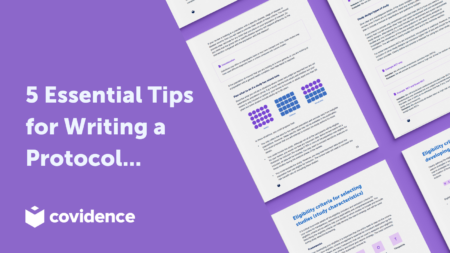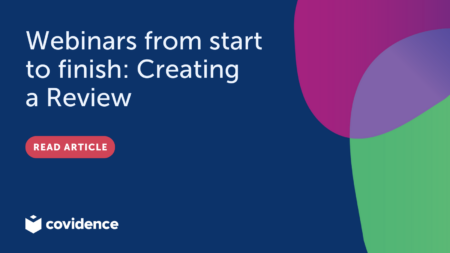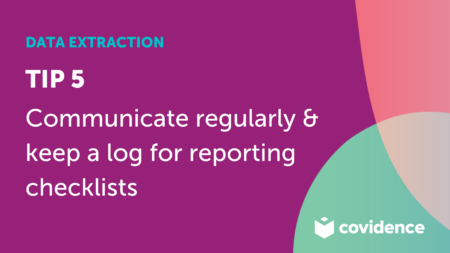Undertaking a systematic review is not for the faint of heart and it can take a toll on your mental health. Recently, studies have shown that rates of severe depression and anxiety are six to eight times higher in the academic community than in the general population (Evans 2018, Woolston 2019), and these are from before the world-wide pandemic which has only made things worse.
We have reached out to Ruchama “Roo” Steinberg, PhD, to shed some light on this topic and provide some tips to manage your mental health while conducting a systematic review. She is the Executive Director at Dragonfly Mental Health, a nonprofit dedicated to cultivating excellent mental health in academics worldwide, run by academics for academics. Dragonfly is helping institutions start prioritizing the mental health of their students, postdocs, faculty, and staff, and knows a thing or two about mental health in academia.take
The Unique Mental Health Challenges of the Systematic Review
“It doesn’t count until someone reads it.” The first time I heard this was from the department head of my undergraduate science program, and I find that after all these years, it still holds true. Writing is what allows academics to share their discoveries, opinions, and theories with their peers, and in the case of the systematic review – to consolidate the evidence on a particular topic. Systematic reviews are critical for revealing the gaps in our collective knowledge so that researchers may craft new studies and fill those gaps, ultimately pushing the field forward.
When I asked my peers about their experiences conducting research and how it impacted their overall mental health, no research format elicited quite as visceral a reaction as that of the systematic review. They used words like “daunting”, “overwhelming”, and “isolating”, and that last one got me thinking. How is the process of a systematic review unique and why do the challenges it poses threaten our mental health in ways other academic research and writing does not?
I spoke to several Dragonfly Mental Health volunteers, all academics themselves, and what I found can be categorized into several overarching themes: systematic reviews 1) evoke feelings of being overwhelmed, 2) are complicated by unclear expectations from supervisors, 3) worsen symptoms of imposter syndrome, and 4) are often hampered by difficulties with focus. Giuliano Tomei, a PhD student in Clinical Psychology in Italy said this, “I certainly found the experience isolating and it impacted my mental health; for almost two months I felt extremely anxious about it and dreaded talking with my supervisor in case they would ask for updates about the work. At times I felt absolutely inadequate for the task and, by extension, for working in academia in general.” He added that working on the review on his own worsened the situation. He had no one with which he could discuss the project and the lack of guidance from supervisors was a major contributing factor to the stress of the entire process. In contrast, even those in a supportive environment can experience negative effects, such as those experienced by Olga Vvedenskaya, MD-PhD, Chief Administrative Officer of Dragonfly Mental Health. She shared that the arduous process led to physical stress-related symptoms despite having a wonderfully supportive advisor.
COVID-19 and Its Impact on Mental Health
Enter the pandemic and subsequent lockdowns, and you introduce a type of isolation and disruption to normal life that many have never experienced before. The global impact of COVID-19 has added numerous hardships we never saw coming. As such, it is unsurprising that recent reports detail the negative consequences of the pandemic and quarantine on mental health (Matthew H. E. M. Browning et al. 2021; UCL COVID-19 Social Study, 2021; Röhr, S., et al., 2020). The 18-29 year old age group, in which most early career academics fall, was most affected, showing the highest rates of both depression and anxiety. Some manifestations of chronic stress due to the pandemic include anxiousness, agitation, sleep issues, and emotional disturbances, all of which would impede any work related activity to varying degrees. Nonetheless, in an effort to drive continued productivity, during this time it was suggested by many advisors that if a student or trainee can’t conduct normal lab activities due to COVID-19, they should “just” write a systematic review instead. Ironically, this resulted in many academic trainees’ stress about the pandemic being compounded by that of the dreaded and isolating systematic review writing process, which for many can seem an insurmountable challenge.
What You Can Do To Manage Your Mental Health
Dragonfly Mental Health and its volunteers have learned that there are steps you can take to manage your stress and make your experience of the systematic review a more pleasant one, even in the midst of a pandemic. The first step is to acknowledge your feelings as a reasonable response to the crisis at hand and take a deep breath, don’t forget to let it out, and repeat! What you are experiencing is normal but that doesn’t mean you must give it control over you.

Feeling Overwhelmed
If you are feeling overwhelmed, focus on staying organized by breaking up the review process into discrete steps. The steps might vary depending on the type of review, but one possible approach could be to:
1) identify your research question
2) define your inclusion/exclusion criteria and methods
3) search for studies
4) screen your studies
5) extract data and assess the quality of the evidence, and finally
6) synthesize and present the results.
Tiffany I. Leung MD, MPH, an Assistant Professor and PhD Candidate at Maastricht University in the Netherlands, who completed a scoping literature review and is now conducting an integrative review, says that using tools like Covidence helps take care of some of the hardest parts of the review, such as applying article inclusion and exclusion criteria collaboratively with multiple team members. However, she warns that, “realistic expectations are definitely needed,” as reviews take a lot of time and patience. So when you feel overwhelmed, remember to be patient with yourself! On top of manuscript processes, writing any type of review is an opportunity to cultivate other skills such as project management, facilitation, and team management.
When writing up the findings of your review, Dr. Vvedenskaya offers some timely advice for non-native English speakers. She suggests using Grammarly or pairing up with a proofreading buddy who can double check your work, as this will reduce anxiety about the quality of your language skills. Lastly, and roll your eyes if you wish, positive self-talk is important! Some of the best writers out there report cheering themselves on. Remind yourself that you can (and should) do this too.
Unclear Expectations
When your main stressors are unclear expectations, set up a meeting with your advisor to decide on scope; also, get a recommended word count or number of references, and set a due date for your first draft. In doing so, you will create clear objectives and concrete goals to work towards. Then create a schedule to work towards them, with planned breaks to eat, sleep, and recharge by going for daily walks or engaging in activities that you find relaxing and enjoyable. Jellila Khatib Ait Abderrahim, a PhD student from Spain working in the field of Neonatal Ethics adds that apps like Asana, designed to help teams organize, track, and manage their work, can help as well.
Imposter Syndrome
 Imposter syndrome, the feeling that you are a fraud or don’t have what it takes to be an academic, can be exacerbated when working on systematic reviews. If this rears its ugly head during the process, it’s helpful to talk to others. Learning about their experiences and finding out what helped them cope may help you find strategies you can use, too. A couple ideas are finding a mentor for additional guidance or tracking your successes (i.e. word count, or number of articles screened). Remind yourself as you go that you are making progress. Mr. Tomei says, “What really helped me at the time was reading other researcher’s experiences and I also involved some friends working in the field, who kindly agreed to put some time aside to have a dialogue.”
Imposter syndrome, the feeling that you are a fraud or don’t have what it takes to be an academic, can be exacerbated when working on systematic reviews. If this rears its ugly head during the process, it’s helpful to talk to others. Learning about their experiences and finding out what helped them cope may help you find strategies you can use, too. A couple ideas are finding a mentor for additional guidance or tracking your successes (i.e. word count, or number of articles screened). Remind yourself as you go that you are making progress. Mr. Tomei says, “What really helped me at the time was reading other researcher’s experiences and I also involved some friends working in the field, who kindly agreed to put some time aside to have a dialogue.”
Trouble Staying Focused
In the event that focus is your main concern, take steps to decrease distractions in your environment by turning off your phone’s social media notifications (or even delete the apps from your phone temporarily!) and finding a location to work that optimizes your process. In the midst of the pandemic managing your environment to minimize anxiety triggers is especially important. Practice mindful relaxation, budget your daily news consumption, and put away electronics at least an hour before bed. Doing these seemingly simple things enables you to wake up focused and refreshed, ready for a new and productive day. While, for many, writing is an isolating and solitary experience, others find working in libraries or busy cafes helpful. These spaces may offer soothing ambient noise or background music that boosts both mood and motivation. For some, collaborative or co-working environments are best where others can act as sounding boards for ideas and you can engage in stimulating conversation. If you are in a part of the world where COVID-19 restrictions have been eased, this could be your golden ticket. However, if you are in a part of the world still heavily impacted by the pandemic, there are virtual alternatives such as Gathertown, a virtual co-working space to which you can invite peers and friends that can be personalized for your needs and specifications. Remember, physical distancing does not have to mean social isolation. Find ways to virtually connect with friends, family, colleagues, and mentors. Suggest informal virtual lab coffee breaks via zoom, start an online journal club, and schedule regular online meetings with your mentors and mentees. You can even socialize with academics around the globe via Dragonfly Cafe, an online informal platform for academics that meets three times a week.
Finding What Works for You
The key is to experiment and find what works for you. As academics we thrive on the scientific process, so use that to your advantage: experiment to find the tools that help you the most! Lastly, and most importantly, when you need help, ask for it. Mr. Tomei offers, “The most important advice I can give is what I would have needed to hear myself: writing a review is a massive endeavour, which takes a lot of time and energy and can be extremely challenging. Make sure you plan ahead and read or watch tutorials to know how to minimize stress and maximize efficiency. Do ask for support from your colleagues or peers, even if it is just an informal chat on the topic you are reviewing, as it can help in a lot of unexpected ways.” And, if things are not improving, don’t hesitate to reach out to a medical provider. Talking to your doctor or finding a therapist may be the most helpful thing to do if you are stuck. Dr. Vvedenskaya adds that in her case “Therapy would have helped for sure. Having someone to talk to about the stress can serve as a pressure release valve, allowing you to prevent bottling up and internalizing your emotions, and helping to manage the impostor syndrome.” Online therapy sessions are the new norm and may even be offered to academics for free via your university, so don’t be afraid to explore your options and reach out for help.
If you or someone you know needs help, here are some resources from around the world:
Australia:
Lifeline Australia 13 11 14
Beyond Blue https://www.beyondblue.org.au/
Germany:
TelefonSeelsorge: 0800.1110111| 0800.1110222
India:
Lifeline +913340447437 / +91 908803030 / contact@lifelinefoundation.in
Samaritans Mumbai +91 84229 84528 / +91 84229 84529 / +84229 84530 / talk2samaritans@gmail.com
Ireland:
Connect counselling Helpline: 1800 477 477
Website: https://connectcounselling.ie/
Samaritans: FreePhone 116123
Israel:
ERAN Suicide Hotline: 1201 (dial 10 for English)
Hotline for victims of abuse, mental and emotional stress: 02-301-1160
Japan:
Tell Lifeline on 03-5774-0992
Malaysia:
Befrienders – 24 hr hotline https://www.befrienders.org.my/
Mexico:
Consejo Ciudadano: 55 5533-5533
New Zealand:
Lifeline 0800 543 354 (0800 LIFELINE) or free text 4357 (HELP)
Samaritans 0800 726 666
Nigeria:
Mentally Aware Nigeria Initiative (MANI) 0809111MANI(6264)
Philippines:
#ThereisHelp at National Centre for Mental Health Crisis hotline 1553 (+63) 917-899-8727 / (02) 7-989-8727
Singapore:
Samaritans 1800 221 4444
IMH Helpline 6389 2222
South Africa:
Suicide Crisis Helpline 0800 567 567
24hr Substance Abuse Helpline 0800 12 13 14
Mental Health Helplines 0800 456 789 / 0800 21 22 23
United States:
National Suicide Prevention Lifeline: 800-273-8255
Crisis Text Line: Text NAMI to 741 741
National Alliance on Mental Illness (NAMI) hotline 1-800-950-NAMI (6264) or info@nami.org
UK:
Mind Infoline on 0300 123 3393 (Monday to Friday, 9am to 6pm)
For advice and support on a wide range of mental health problems.
Samaritans free at any time, on 116 123
For people experiencing suicidal thoughts.
References:
Browning, Matthew H E M et al. Psychological impacts from COVID-19 among university students: Risk factors across seven states in the United States. PloS one vol.16,1 e0245327 (2021). https://doi.org/10.1371/journal.pone.0245327
Evans, T., Bira, L., Gastelum, J. et al. Evidence for a mental health crisis in graduate education. Nat Biotechnol 36, 282–284 (2018). https://doi.org/10.1038/nbt.4089
Fancourt, D., Bu, F., Mak, H.W., et al. UCL Covid-19 Social Study. Results Release 8. Department of Behavioral Science & Health. Nuffield Foundation. (2020)
Röhr, Susanne et al. Psychosoziale Folgen von Quarantänemaßnahmen bei schwerwiegenden Coronavirus-Ausbrüchen: ein Rapid Review [Psychosocial Impact of Quarantine Measures During Serious Coronavirus Outbreaks: A Rapid Review]. Psychiatrische Praxis vol.47,4 (2020): 179-189. doi:10.1055/a-1159-5562
Ruth I. Karpinski, Audrey M. Kinase Kolb, Nicole A. Tetreault, Thomas B. Borowski,
High intelligence: A risk factor for psychological and physiological overexcitabilities,
Intelligence, Volume 66,Pages 8-23 (2018). https://doi.org/10.1016/j.intell.2017.09.001.
Woolston, C. PhD poll reveals fear and joy, contentment and anguish. Nature 557, 403-406 (2019). https://doi.org/10.1038/d41586-019-03459-7



